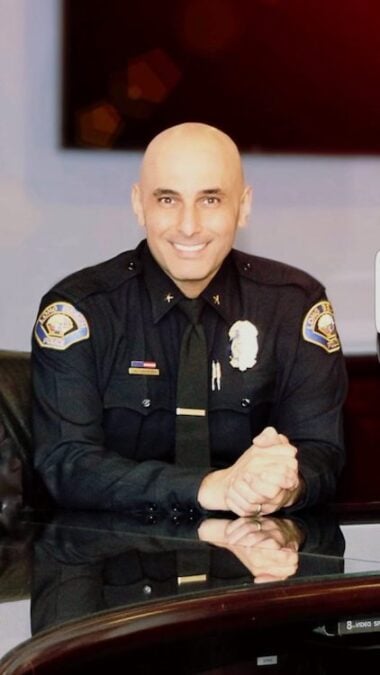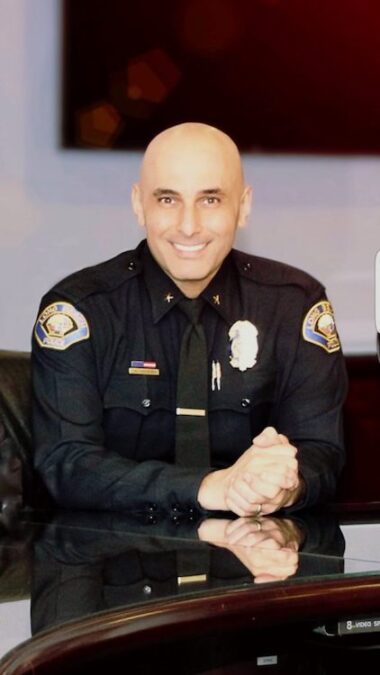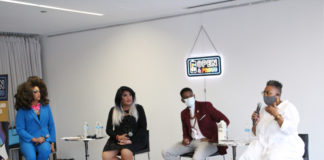
Long Beach Police Chief Wally Hebeish attended a community forum earlier this month, where he promised transparency to the public, but that promise quickly turned to dust when he refused to answer questions from a local gay journalist. Photo: City of Long Beach
Commentary
Long Beach Police Chief Wally Hebeish attended a community forum earlier this month, where he promised transparency to the public, but that promise quickly turned to dust when he refused to answer questions from a local gay journalist.
Wally Hebeish
Hebeish was appointed police chief in December 2021 after Robert Luna retired to run for Los Angeles County Sheriff. Hebeish had been assistant chief since 2019.
Hebeish, who became police chief Jan. 1, was appointed by Tom Modica, Long Beach’s city manager.
Wally Hebeish “is committed to policing principles rooted in customer service and strengthening relationships within our diverse community,” according to his biography on the department website.
In a press release about Hebeish’s appointment, Modica said, “Chief Hebeish possesses a thorough understanding of critical issues and priorities currently affecting our Long Beach community. He continues to lead and inspire our police department personnel and has been instrumental in implementing programs and initiatives that increase public trust surrounding equity and constitutional policing, improve employee wellness, and address crime in our community.”
All those platitudes sound fabulous, but we know actions speak louder than words, and do they ever in this case.
Hebeish has been a public servant with the Long Beach Police Department for 27 years, joining in 1995 and working his way up the ranks.
Meeting the police chief
On Dec. 12, Wally Hebeish joined Kelly Colopy, director of the Long Beach Department of Health and Human Services, at the Bixby Park Community Center for a public meeting on public safety in the Second District.
At the end of the meeting, Q Voice News approached Hebeish. It was the first time since he has been police chief that we had the opportunity to interview him.
I showed him my press identification and introduced myself.
I activated my smartphone to record audio of the interview, and said I wanted to ask him a few questions.
In a pseudo-jovial tone, Hebeish said I needed his permission to record the interview.
I reminded him that he is a public official at a public event, meaning consent is not required.
To be specific, California law says that “any conversations occurring in public places or government proceedings open to the public, or where the participants could reasonably expect to be overheard or recorded” does not need permission to be recorded.
Hebeish then said he knew me and Q Voice News.
He said he recognized me from police department press conferences, though the last one I attended was more than 18 months ago.
Considering the number of people and journalists Hebeish communicates with on a regular basis, I guess I left an impression on him. It’s also nice to hear that people read Q Voice News.
Landmark lewd conduct case
Hebeish also said he knew what I was going to ask him.
“Oh really?” I responded.
“You’re going to ask for an apology related to the Moroney case,” Hebeish said.
He was making reference to the landmark 2016 lewd conduct case that was dismissed by a judge at the Long Beach courthouse.
That ruling was historic because it was the first time a Long Beach judge had thrown out a lewd conduct arrest from one of the department’s decoy sting operations during a preliminary hearing.
These insidious arrests and operations had been taking place in Long Beach since 1914. That’s right, more than 100 years.
In his blistering ruling, Judge Halim Dhanidina also criticized the police department’s tactics and behavior as unconstitutional and homophobic.
Hostile to journalist
Actually, I asked Hebiesh why — six years after the Dhanidina ruling — neither he nor the department has apologized to the gay community for the department’s cruel and unconstitutional treatment of gay men?
“Everybody should be treated fairly. Everybody should be treated with dignity and respect, and it should be equitable,” he said.
“To talk about specific historical inequalities is very difficult because I wasn’t here 100 years ago,” he said. “I apologize for anything we have done to anybody that is marginalized in any community in the city.
“That’s my position as chief of police moving forward, and I hope that answers your question,” Hebeish said.
“You didn’t answer my question,” I responded.
“I’m not here to do interviews. You’re the media. This event is to talk to the community, and THIS is over,” Hebeish said in a defensive tone.
“If you’d like to do an interview with me, you can reach out to our media relations team,” he said.
Hebeish’s promise to be transparent lasted less than one hour.
Unfortunately, Hebeish doesn’t value that the press is a vital part of the community and serves a vital watchdog role for the community.
Hebeish’s attempt to shut us down didn’t discourage us.
“You disagreed with the judge’s ruling?” I asked.
“That’s an assumption on your part,” Hebeish snapped.
“I’m asking you a question,” I responded.
“We changed our practices based on that ruling. What does that tell you?” said Hebeish, who then continued repeating he wasn’t at the public meeting to do media interviews and walked away.
Long Beach police’s dark history of discriminating against gay men
Forced to change homophobic practices
The reaction to the judge’s ruling tells me that the department changed its policy not based on good faith, not because officials realized they had been doing anything wrong.
Civil rights advocates and lawyers had been raising the alarm for decades that the arrests were false and gay men were being targeted for discrimination and homophobia.
The department knew exactly what it was doing with these strategic undercover sting operations, according to court documents in the Moroney case.
The department had pushed its cruelty as long as it could.
The department only changed because it got caught by a judge, who said their tactics and behavior were homophobic and unconstitutional.
The police department had to change.
In essence, the department was brought — kicking and screaming — into the 21st century.
Fails transparency test
The department’s treatment of gay men and its response to the judge’s ruling is similar to Hebeish’s reaction to the media and our questioning during that public meeting.
Hebeish has been in the department for 27 years. He knows the law around recording conversations and knows the standards and practices press access. Someone doesn’t rise to the position of police chief without knowing the press fundamentals.
Hebeish’s behavior; however, is the equivalent of flipping the bird to the press. He will ignore the law until someone calls him out on it, like we did about recording an interview.
Hebeish views the media as an annoyance. He views the press as an adversary.
Also, Hebeish doesn’t want to be spontaneously asked tough questions or questions about accountability.
He wants to control the narrative and control the interview.
Hebeish wants time to prepare his answers, giving him a chance to put the best spin on the situation.
Those tactics fail the transparency test.
Related posts:








